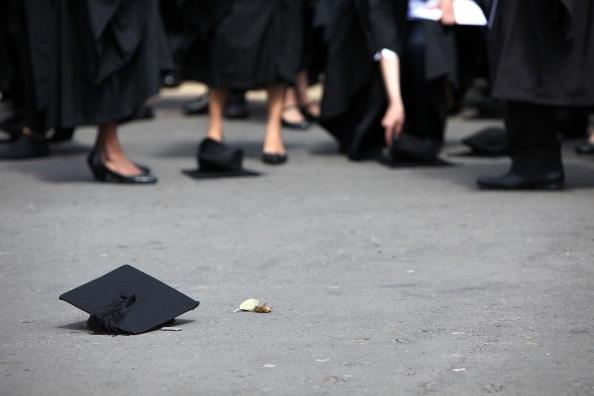Reading University under fire after claiming to be in top 1% in the world
UK institutions warned against false advertising, since league tables can be deemed incomplete and do not assess every single university worldwide

Your support helps us to tell the story
This election is still a dead heat, according to most polls. In a fight with such wafer-thin margins, we need reporters on the ground talking to the people Trump and Harris are courting. Your support allows us to keep sending journalists to the story.
The Independent is trusted by 27 million Americans from across the entire political spectrum every month. Unlike many other quality news outlets, we choose not to lock you out of our reporting and analysis with paywalls. But quality journalism must still be paid for.
Help us keep bring these critical stories to light. Your support makes all the difference.
The University of Reading has come under fire for allegedly making false claims it is in the “top 1 per cent” of the world’s universities.
The Advertising Standards Authority (ASA) has since asked the institution to remove the claim from its website, after a complaint was made to the regulating body.
The discrepancy comes as new World University Rankings are released, detailing the most reputable and top-performing institutions across the globe.
A description of the University of Reading as being in the top 1 per cent worldwide had been challenged by a complainant, who said such a figure could not be substantiated and could be misleading, the BBC reported.
The ASA said the issue had since been “informally resolved”, with the university agreeing to remove the claim, without going ahead with a formal investigation or ruling.
The matter has invited debate as to how university rankings can be used in marketing, since the tables are deemed especially important for the recruitment of students from overseas.
Several other top-performing institutes in the UK currently make similar claims on their websites and advertising brochures based on the much revered QS and Times Higher Education global league tables.
Charles Heymann, the University of Reading’s head of corporate communications, welcomed the clarification over how universities can present global rankings, suggesting that it was not just Reading that had suffered confusion over rankings.
“It now needs to investigate every single other UK university which claims it is in the top 1 per cent in the world, rather than waiting for individual complaints to be made,” he said of the ASA.
“Like dozens of other UK universities in recent years, we judged this put us in the top 1 per cent out of an estimated 20,000 institutions internationally.
“We accept, though, the ASA’s view that this could not be proved given no league table assesses every single university worldwide.”
While the advertising claims had been made “all in good faith”, he acknowledged that universities must accept stricter marketing rules as the industry continues to grow.
Since boasts about the institution’s top percentage status have been printed in brochures and other literature, Reading has agreed to phase out the potentially misleading claims, but said it would take some time.
A total of 76 UK institutions are included in the QS rankings for 2018, with 51 dropping down the list.
Cambridge University has been named top for the UK, ranking in fifth place globally – down from fourth place last year.
Oxford takes sixth place and University College London comes in seventh, both retaining their positions from last year.
Overall, 16 of the 24 Russell Group Universities have fallen down the ranks.
This is thought to be the result of a squeeze on university resources as well as increasing competition from other parts of the world, rather than the impact of Brexit, experts suggested.
The rankings assess university performance in four areas – research, teaching, employability and internationalisation.
Ben Sowter, head of research at QS, said: “Though the temptation may be to attribute the UK’s second year of struggle to Brexit, we would warn against doing so.
“Much of the data we collect for these tables has been collected over a five-year period, and the first year of post-Brexit internationalisation scores suggests that there has, thus far, been a minimal impact on international student and faculty rates at UK institutions.
”Of greater importance, we believe, is the continued strain on university resources, which appears to be having a deleterious impact on not just research, but also the capacity to deliver world-class teaching.
“Also of greater significance than Brexit is the simple and unavoidable truth that these rankings are a relative exercise, and the rest of the world is becoming increasingly competitive.”
Dr Tim Bradshaw, acting director of the Russell Group, added: “The UK remains a world-leader in higher education and Russell Group universities have been fundamental to this success. Our members continue to deliver an excellent teaching and learning experience for students.
“By this ranking, four of the top 10 universities in the world are Russell Group institutions. Of course, there is always room for improvement and maintaining our global position in teaching, research and innovation requires investment.
“For a number of years, funding for teaching has been squeezed. The position is particularly acute in engineering and some of the sciences where the need for specialist facilities, equipment and technical support adds to the cost of teaching.
“This is something that the new government will have to look at closely if universities are to deliver the jobs and growth that we all want to see for the UK.”
Subscribe to Independent Premium to bookmark this article
Want to bookmark your favourite articles and stories to read or reference later? Start your Independent Premium subscription today.
Join our commenting forum
Join thought-provoking conversations, follow other Independent readers and see their replies
Comments